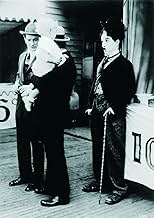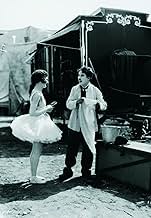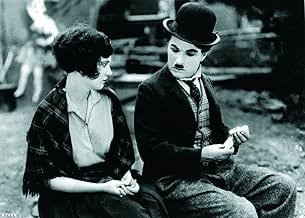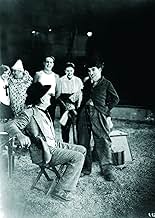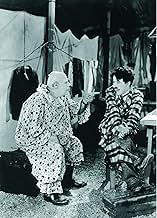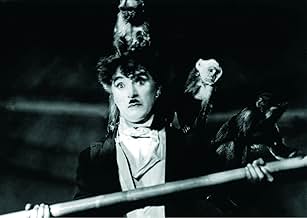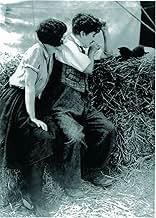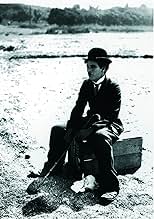VALUTAZIONE IMDb
8,1/10
37.560
LA TUA VALUTAZIONE
Charlot, il vagabondo, trova un lavoro e la ragazza dei suoi sogni in un circo.Charlot, il vagabondo, trova un lavoro e la ragazza dei suoi sogni in un circo.Charlot, il vagabondo, trova un lavoro e la ragazza dei suoi sogni in un circo.
- Premi
- 3 vittorie totali
Charles Chaplin
- A Tramp
- (as Charlie Chaplin)
Al Ernest Garcia
- The Circus Proprietor and Ring Master
- (as Allan Garcia)
Tiny Sandford
- The Head Property Man
- (as Stanley J. Sandford)
Albert Austin
- Clown
- (non citato nei titoli originali)
Chester A. Bachman
- Cop
- (non citato nei titoli originali)
Eugene Barry
- Cop
- (non citato nei titoli originali)
Jack Bernard
- Man in Circus Audience
- (non citato nei titoli originali)
Stanley Blystone
- Cop
- (non citato nei titoli originali)
Heinie Conklin
- Clown
- (non citato nei titoli originali)
Toraichi Kono
- Man in Circus Audience
- (partecipazione non confermata)
- (non citato nei titoli originali)
H.L. Kyle
- Man in Circus Audience
- (non citato nei titoli originali)
Betty Morrissey
- The Vanishing Lady
- (non citato nei titoli originali)
Recensioni in evidenza
The Circus was both my first silent film and the first film I've watched by Charles Chaplin. Being my first silent film i thought for sure i would be bored to death, but was i wrong. The film was really funny, made me laugh out loud. The comedy in this film is very different to the comedy in films now a days. Now a days most comedy films are big on the special effects and just lame humor. In the circus the actors have actual talent, they have to be very good at showing there emotion, like facial expressions and things like that.I was amazed on how well the movie was, Charlie Chaplin is great and i hope soon i can get my hands on some more of his films. I almost wish they could make a films like this today just maybe with some color, i think it'd be a great idea.
The Circus is probably Chaplin's most underrated film. It is (easily) one of the funniest movies ever, and the inventiveness of such shots as the Mirror Maze scene and the closing sequence are nothing less than brilliant. What separates Chaplin from other comedian filmmakers is his ability to evoke a sense of pity and/or sympathy for his character. How can you watch the closing scenes of this film and, even after all of the laughter, NOT sense a bit of melancholia welling up in your heart? Truly one of the greats.
This is easily one of the best Chaplin Movies.It has a great sense of humour,very interesting cinematography and very well written characters.This movie contains some of the funniest gags I have ever seen in my life,and it is definetely one of the greatest comedies ever made.
The whole movie was very interesting,it kept from start to finish.The script had a very good structure,filled with great characters that become even more interesting due to some awesome acting by everyone.Also the ending is epic.Chaplin sympolises the circus as the cinema that is heading into a new direction,while the Trump(being obviously him is just not coming with them,and continues with his life like he used to).It is so clever,yet so simple.And that is the magic behind Chaplin.He uses music,characters,gags,to express himself and in the end make you cry.
The Little Tramp is chased into a circus tent during a performance; his antics prove funnier than those of the clowns, and the ringmaster hires him for the show.
When a comedian plays a character who is inadvertently hilarious, it can seem narcissistic: just check out Jerry Lewis's "The Errand Boy" where Lewis has his supporting cast praise the comic genius of the character played by Jerry Lewis. Despite this danger, and despite Chaplin's off-screen egotism, the premise plays beautifully, especially since The Little Tramp (though not Chaplin) is such a terrible comedian when he's trying to be one. My favorite moment is when the ringmaster demands the auditioning Tramp to be funny right that instant: the Tramp grins and shyly dances around a bit, gingerly falls down, puts his cane between his legs and meekly lifts himself back up. "Terrible!" roars his would-be employer.
This film has more self-awareness over comedy conventions that any other Chaplin I know of. The Tramp ineptly (but hilariously) performs a couple of standard comedy routines with the other circus clowns. Later, there's a funny twist to the old banana peel gag; and near the end he crashes into an old general store, looking as if he's thrust himself back into his old Keystone days. This is Chaplin's last true silent film, and the Keystone moment feels like a nostalgic farewell to the past.
"The Circus" is funny throughout, but the opening scenes are probably the best. There's a marvelous funhouse sequence and a priceless routine where The Tramp pretends to be a motorized dummy. (Has anyone seen the Swiss clock routine from "Your Show of Shows"?) He also falls in love with the ringmaster's cruelly treated daughter, which leads to a poignant ending.
I enjoyed the music, which Chaplin composed for this film in 1969. His scores are always repetitive; but they're also sweet and funny and they enhance the action. I could have done without the title-sequence song (which he sings himself)—something about looking up at rainbows. Otherwise, this comedy is near-perfect and holds its own against Chaplin's even greater features, "The Gold Rush," "City Lights" and "Modern Times."
When a comedian plays a character who is inadvertently hilarious, it can seem narcissistic: just check out Jerry Lewis's "The Errand Boy" where Lewis has his supporting cast praise the comic genius of the character played by Jerry Lewis. Despite this danger, and despite Chaplin's off-screen egotism, the premise plays beautifully, especially since The Little Tramp (though not Chaplin) is such a terrible comedian when he's trying to be one. My favorite moment is when the ringmaster demands the auditioning Tramp to be funny right that instant: the Tramp grins and shyly dances around a bit, gingerly falls down, puts his cane between his legs and meekly lifts himself back up. "Terrible!" roars his would-be employer.
This film has more self-awareness over comedy conventions that any other Chaplin I know of. The Tramp ineptly (but hilariously) performs a couple of standard comedy routines with the other circus clowns. Later, there's a funny twist to the old banana peel gag; and near the end he crashes into an old general store, looking as if he's thrust himself back into his old Keystone days. This is Chaplin's last true silent film, and the Keystone moment feels like a nostalgic farewell to the past.
"The Circus" is funny throughout, but the opening scenes are probably the best. There's a marvelous funhouse sequence and a priceless routine where The Tramp pretends to be a motorized dummy. (Has anyone seen the Swiss clock routine from "Your Show of Shows"?) He also falls in love with the ringmaster's cruelly treated daughter, which leads to a poignant ending.
I enjoyed the music, which Chaplin composed for this film in 1969. His scores are always repetitive; but they're also sweet and funny and they enhance the action. I could have done without the title-sequence song (which he sings himself)—something about looking up at rainbows. Otherwise, this comedy is near-perfect and holds its own against Chaplin's even greater features, "The Gold Rush," "City Lights" and "Modern Times."
Perhaps this doesn't have quite the reputation of Charlie Chaplin's greatest movies, but it is very entertaining, and it's a good showcase both for his comic genius and also for his skill as a film-maker. It's full of very funny routines along with plenty of action, with enough of a story to make you care about the characters, too.
The setting in "The Circus" certainly gives Chaplin a lot of ready-made material, and he makes the most of it, coming up with hilarious routines involving everything from a hall of mirrors to a lion. His 'Tramp' character gets involved in all kinds of amusing predicaments that involve several other interesting characters. Most of it keeps a pretty light tone, which makes the serious parts that much more effective. And there are several sequences which, though perhaps not as well known as some of the scenes from other Chaplin films, are quite funny and creative.
With plenty of humor and Chaplin's trademark sympathetic characters, this is a very enjoyable feature for anyone who appreciates classic comedy.
The setting in "The Circus" certainly gives Chaplin a lot of ready-made material, and he makes the most of it, coming up with hilarious routines involving everything from a hall of mirrors to a lion. His 'Tramp' character gets involved in all kinds of amusing predicaments that involve several other interesting characters. Most of it keeps a pretty light tone, which makes the serious parts that much more effective. And there are several sequences which, though perhaps not as well known as some of the scenes from other Chaplin films, are quite funny and creative.
With plenty of humor and Chaplin's trademark sympathetic characters, this is a very enjoyable feature for anyone who appreciates classic comedy.
Lo sapevi?
- QuizIn the 1969 reissue, the 80-year-old Sir Charles Chaplin sang the title song.
- BlooperAfter the tramp washes the shaving cream from his face, he dries himself with a towel, but the towel never touches his face. (This is probably so that it won't mess up the stage makeup.)
- Citazioni
The Circus Proprietor and Ring Master: Go ahead and be funny.
- Versioni alternativeCharles Chaplin replaced the original credits of this film when he reissued it in 1969. In their place, there is an opening scene featuring Merna Kennedy on the trapeze while Chaplin sings a song, then the image fades to the credits of that version with no cast nor technical credits.
- ConnessioniFeatured in The Circus: Premiere (1928)
I più visti
Accedi per valutare e creare un elenco di titoli salvati per ottenere consigli personalizzati
Dettagli
- Data di uscita
- Paese di origine
- Siti ufficiali
- Lingue
- Celebre anche come
- The Circus
- Luoghi delle riprese
- Glendale, California, Stati Uniti(ending exterior scenes - the circus wagons depart south on Verdugo Rd. from Glenoaks Blvd.)
- Azienda produttrice
- Vedi altri crediti dell’azienda su IMDbPro
Botteghino
- Budget
- 900.000 USD (previsto)
- Lordo in tutto il mondo
- 33.854 USD
- Tempo di esecuzione1 ora 12 minuti
- Colore
- Mix di suoni
- Proporzioni
- 1.33 : 1
Contribuisci a questa pagina
Suggerisci una modifica o aggiungi i contenuti mancanti


